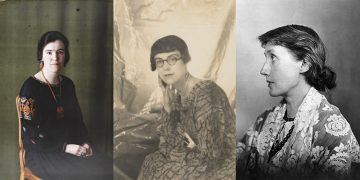Francesca Wade at the Paris Review:
 “I would venture to guess that Anon, who wrote so many poems without signing them, was often a woman,” wrote Virginia Woolf in A Room of One’s Own (1929). In that essay, commenting on the fact that women’s lives are “all but absent from history,” she argues that this is not only a consequence of the ways women have been deprived of the material conditions under which their talents can prosper but also reveals the sort of events and lives historians have traditionally considered worth remembering—primarily, the public activities of “great men.” Perusing the index of G. M. Trevelyan’s History of England, Woolf looks up “position of women” and is dismayed to find only a smattering of references, mostly to customs of arranged marriage, wife-beating, and the fictional heroines of Shakespeare. Flicking through chapters on wars and kings, she wonders why so little room is left for women’s activities in the events that “constitute this historian’s view of the past.” It was clear to Woolf that new histories were needed, which would examine the reality of women’s lives, their relationships and activities, and the forces that thwarted their ambitions.
“I would venture to guess that Anon, who wrote so many poems without signing them, was often a woman,” wrote Virginia Woolf in A Room of One’s Own (1929). In that essay, commenting on the fact that women’s lives are “all but absent from history,” she argues that this is not only a consequence of the ways women have been deprived of the material conditions under which their talents can prosper but also reveals the sort of events and lives historians have traditionally considered worth remembering—primarily, the public activities of “great men.” Perusing the index of G. M. Trevelyan’s History of England, Woolf looks up “position of women” and is dismayed to find only a smattering of references, mostly to customs of arranged marriage, wife-beating, and the fictional heroines of Shakespeare. Flicking through chapters on wars and kings, she wonders why so little room is left for women’s activities in the events that “constitute this historian’s view of the past.” It was clear to Woolf that new histories were needed, which would examine the reality of women’s lives, their relationships and activities, and the forces that thwarted their ambitions.
more here.
